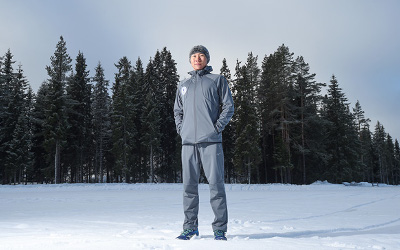AKIPRESS.COM -  Ochirsukh Adiyabaatar’s journey from Mongolian city life to the ski slopes of Lillehammer has been an unlikely one. He grew up in a country where basketball, martial arts, lifting events and horse riding reign supreme. His chosen discipline, cross-country skiing, barely registers on the national consciousness, reports a reporter for the Lillehammer Youth Information Service, Nick Moore.
Ochirsukh Adiyabaatar’s journey from Mongolian city life to the ski slopes of Lillehammer has been an unlikely one. He grew up in a country where basketball, martial arts, lifting events and horse riding reign supreme. His chosen discipline, cross-country skiing, barely registers on the national consciousness, reports a reporter for the Lillehammer Youth Information Service, Nick Moore.
“All my friends at school only like basketball, and they are curious about what I’m doing on skis,” he said. “But my mum used to do it, so she encouraged me to give it a go. I’m glad she did. I love it, and it has given me the chance to travel the world.”
Training is not easy for the 17-year-old, who was given permission from his high school to come to Scandinavia. “There is no snow where I live, in Erdenet, which is Mongolia’s third-biggest city,” he said. “I have to travel 240km, up towards Ulaanbaatar, to find some snow.
“Otherwise I have to just train by running, which keeps me fit, but isn’t so useful when it comes to doing the event. I don’t have a ski training machine or anything like that. I’m a good runner though, and have won a bronze medal in a [national] competition in Mongolia.”
Adiyabaatar also found himself in for a bit of a shock when he hit the training slopes in Lillehammer. “In Mongolia where I train, the mountain is kind of flat; it’s not hilly like it is here in Norway. I found it very difficult to train on; I’ve never done anything like this before. On the first day, I fell over a lot because of it being extremely up and down. I lost balance, but I’m getting used to it now. It’s a course that will suit athletes with a lot of height and strength, and I’m not so tall. So I’m going to have to train hard this week otherwise it will be very tough for me to compete.
“In this region, skiing is really very competitive. It is very common. Norwegian people grow up skiing and use skis to get around everywhere. There are some great athletes here, but I’m going to enjoy myself.”
While he may not be troubling the podium in Lillehammer, Adiyabaatar recognizes the importance of his role to both his sport and his country.
“I like to think I’m representing Mongolia in skiing here, showing that winter sports are something we can do. I’m also representing the sport in Mongolia, telling people that it’s a great activity that keeps you really fit. More and more people are getting interested in cross country back home, and there are a growing number of young athletes learning to ski.”
The Mongolian contingent in Lillehammer, who flew in via Moscow, consists of just two athletes, two coaches and their federation secretary. “It’s been great, I love the village and have made friends already,” Adiyabaatar said. “All my friends back home can’t believe it. They say ‘dude, you are seeing the world’, and ask me to take photos for them. Most of them have never been outside Mongolia.”
There’s just one problem left for the athlete who has overcome myriad difficulties of being involved in a minority winter sport while living in a city with no snow. “I have to eat a lot, but I try to avoid eating meat,” he said. “But Mongolians eat so much meat and so do Norwegians. I think it can be bad for you, so I stick to vegetables as training food. I particularly like carrots.”
